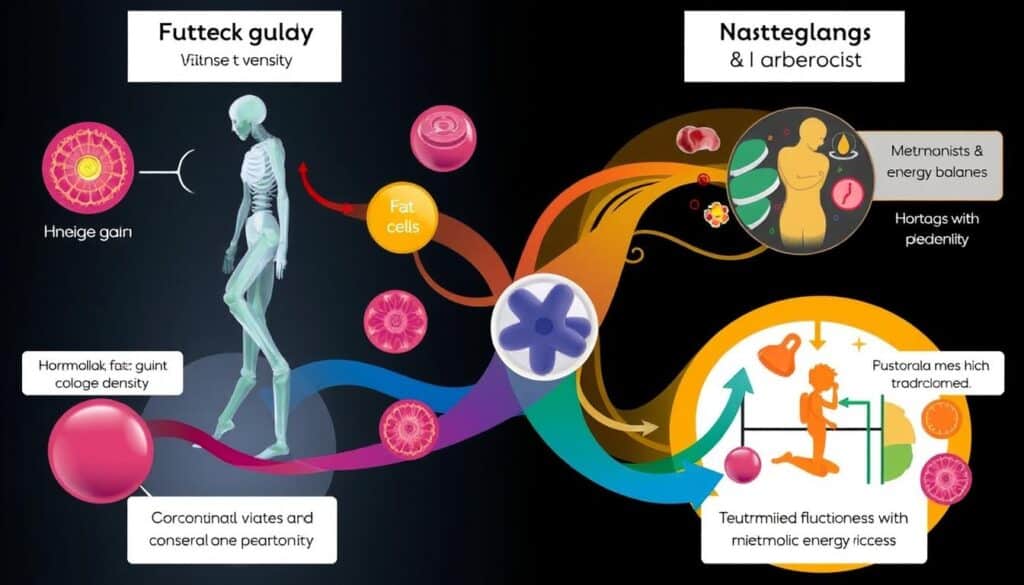When our doctor first mentioned Prolia, a powerful osteoporosis medication, we felt a mix of hope and uncertainty. The journey with denosumab isn’t just about bone health. It’s also about understanding how this treatment might impact our entire body, including potential weight changes that many patients experience.
Navigating the complex world of osteoporosis medication can feel overwhelming. We’ve learned that understanding the potential side effects of Prolia is crucial for making informed healthcare decisions. Weight gain is a concern that many patients discuss, and we’re here to explore what research and medical experts reveal about this topic.
Our goal is to provide clear, compassionate insights into Prolia and weight gain. By examining the latest medical research and patient experiences, we’ll help you understand what to expect. We’ll also show how to manage potential changes in your body while treating osteoporosis with this medication.
Key Takeaways
- Prolia is a significant osteoporosis medication with potential weight-related side effects
- Understanding individual body responses is crucial when starting denosumab treatment
- Open communication with healthcare providers helps manage medication concerns
- Weight changes can be influenced by multiple factors beyond medication
- Proactive health monitoring is essential during osteoporosis treatment
Understanding Prolia: An Overview
Exploring osteoporosis medication can be tough. Prolia is a strong option for those with bone density problems. It’s a treatment for degenerative joint conditions that helps manage bone health.
What is Prolia?
Prolia is a new way to fight osteoporosis. It’s a denosumab-based injectable. It’s made to tackle bone density issues in a unique way.
This medication targets specific parts of our bones. It helps stop bone loss and lowers the chance of fractures.
- Prescription injectable medication
- Targets bone density preservation
- Recommended for postmenopausal women and men at high fracture risk
How Does Prolia Work?
Prolia works by stopping bone breakdown. It’s a special osteoporosis drug. Denosumab blocks proteins that cause bone loss.
This method keeps bones strong and intact. It’s a smart way to handle bone health.
“Prolia represents a sophisticated approach to managing bone health through targeted molecular intervention.” – Bone Health Research Institute
| Characteristic | Prolia Details |
|---|---|
| Active Ingredient | Denosumab |
| Administration | Subcutaneous injection every 6 months |
| Primary Function | Prevent bone density loss |
| Target Population | Postmenopausal women, men with osteoporosis risk |
Knowing about Prolia helps us make better choices for our bones. It lets us understand its benefits. This way, we can work with doctors to find the best treatment for us.
The Connection Between Prolia and Weight Gain
Patients on Prolia often wonder about weight changes. It’s important to understand how this osteoporosis drug affects weight. This knowledge helps manage health concerns and expectations.
Is Weight Gain a Common Side Effect?
Weight gain isn’t a common side effect of Prolia. Studies show mixed results on weight changes with this drug. Some patients see little change, while others notice slight differences in body composition.
- Not a universal side effect for all patients
- Individual responses vary
- Limited direct correlation between Prolia and significant weight gain
What Research Says About Weight Changes
Research on Prolia’s weight impact shows complex findings. Some patients report small weight changes. But, there’s no clear link between Prolia and big weight gain.
“Individual metabolic responses to medications can differ significantly.” – Osteoporosis Research Institute
| Research Observation | Weight Change Percentage |
|---|---|
| Minor Weight Fluctuations | 2-5% |
| Significant Weight Gain | Less than 1% |
| No Measurable Changes | Approximately 70% |
Talk to your doctor about Prolia and weight concerns. They can offer advice tailored to your health and history.
Identifying Symptoms of Weight Gain with Prolia
Women after menopause taking Prolia should watch for weight changes. These changes might be a side effect. Knowing these symptoms helps us make better health choices.
Signs We Should Watch For
Spotting early signs of weight gain is key to staying healthy. Look out for:
- Unexplained weight increase of 5-10 pounds
- Noticeable changes in body composition
- Difficulty fitting into usual clothing sizes
- Increased waist circumference
When to Consult Our Healthcare Provider
Some weight changes need a doctor’s check-up. If you notice:
- Rapid weight gain within a short period
- Persistent weight changes despite diet and exercise
- Accompanying symptoms like fatigue or mood changes
“Early detection and communication with your doctor are crucial in managing potential side effects of Prolia.” – Osteoporosis Research Institute
Tracking Weight Changes
| Symptom | Action Required | Potential Significance |
|---|---|---|
| 5-10 lbs weight gain | Monitor closely | Possible medication effect |
| 10-15 lbs weight gain | Consult healthcare provider | Potential metabolic changes |
| 15+ lbs weight gain | Immediate medical evaluation | Significant health concern |
Remember, individual experiences with side effects can vary. Talking openly with our healthcare team is important. This way, we get advice tailored to our needs during Prolia treatment.
Potential Mechanisms of Weight Gain
Exploring the link between Prolia and weight changes reveals key biological processes. These can affect our weight during hormone therapy for osteoporosis.

Grasping these mechanisms is crucial for managing health and expecting body changes during treatment.
Hormonal Influences on Weight
Hormone therapy can change how our body processes energy. Prolia affects bone metabolism, leading to hormonal shifts that might alter weight.
- Alterations in bone density hormone signals
- Potential shifts in metabolic rate
- Interaction with endocrine system functions
Metabolic Changes and Body Composition
Osteoporosis meds like Prolia can subtly change our metabolism. These changes can show up in different ways in our bodies.
| Metabolic Factor | Potential Impact |
|---|---|
| Muscle Mass | Potential reduction in lean tissue |
| Basal Metabolic Rate | Possible decrease in caloric expenditure |
| Hormonal Regulation | Changes in insulin sensitivity |
“Our bodies respond uniquely to medical treatments, making individual experiences with weight changes diverse and complex.” – Endocrinology Research Institute
Talking to healthcare pros about these mechanisms is key. It helps create a plan for managing weight during Prolia treatment.
Managing Weight While on Prolia
Managing weight on Prolia needs a smart plan. We must understand how it affects our weight and keep our health in check. With the right approach, we can avoid big weight changes.
Dietary Considerations for Balanced Nutrition
Eating right is key when taking Prolia. We can boost our health with the right foods:
- Eat foods rich in calcium and vitamin D for bones
- Choose foods that help prevent fractures
- Watch your portion sizes for a balanced diet
- Drink plenty of water and low-calorie drinks
Importance of Physical Activity
Exercise is vital for a healthy weight and strong bones. Our workout plan should include:
- Low-impact cardio
- Strength training with a doctor’s okay
- Flexibility and balance exercises
- Light weight-bearing activities
Setting Realistic Goals
Setting goals keeps us motivated and tracks our progress. We should aim for goals that fit our health needs.
| Goal Type | Recommended Approach | Frequency |
|---|---|---|
| Weight Management | Gradual weight loss/maintenance | Monthly check-ins |
| Exercise | 30 minutes of activity | 4-5 times per week |
| Nutrition | Balanced meal planning | Daily tracking |
“Success in weight management is about consistent, sustainable choices.” – Nutrition Expert
By using these tips, we can manage our weight on Prolia. Always talk to our doctor for advice tailored to us.
Discussing Weight Concerns with Our Doctor
Talking about weight changes with a doctor about Prolia can be tough. It’s key to talk openly with our healthcare provider. This helps us understand side effects and keep our health in check.
Being ready for talks about osteoporosis meds makes them more useful. It helps us learn more.
Preparing for the Conversation
Getting ready helps us share our worries clearly. Here’s how:
- Keep a record of weight changes since starting Prolia
- Track any diet or exercise changes
- Write down specific questions about side effects
- Bring a list of all meds we’re taking
Questions to Ask Our Healthcare Provider
It’s important to ask the right questions about our treatment:
- Could Prolia be causing my weight changes?
- What metabolic effects might this drug have?
- Are there other treatments with different side effects?
- How can we keep an eye on and handle weight changes?
“Knowledge is the first step toward effective healthcare management.” – Medical Professionals
| Topic | Recommended Action |
|---|---|
| Weight Tracking | Monthly weigh-ins and documentation |
| Medication Review | Quarterly consultation with healthcare provider |
| Lifestyle Adjustments | Personalized diet and exercise plan |
Remember, our healthcare provider is our partner in managing osteoporosis medication and overall wellness.
Alternatives to Prolia
Looking into other osteoporosis treatments can help us make better choices for our bones. Prolia is effective, but knowing other options helps us work with our doctors better.
Our search for the best bone health plan involves looking at many treatments. Each medicine has its own good points and possible downsides.
Comprehensive Osteoporosis Treatment Options
- Bisphosphonates (Fosamax, Boniva)
- Selective Estrogen Receptor Modulators (SERMs)
- Hormone Replacement Therapy
- Teriparatide
- Raloxifene
Comparing Treatment Approaches
| Medication | Fracture Prevention | Side Effects | Administration |
|---|---|---|---|
| Bisphosphonates | High | Digestive issues | Daily/Weekly oral |
| Teriparatide | Moderate to High | Injection site reactions | Daily injectable |
| Raloxifene | Moderate | Blood clot risk | Daily oral |
Choosing the right bone density treatment needs careful thought. Each option has its own benefits for fighting osteoporosis.
Our health journey is personal. What works for one patient might not be ideal for another.
Key Considerations for Medication Selection
- Personal medical history
- Bone density test results
- Potential side effects
- Lifestyle factors
- Cost and insurance coverage
Talking to our doctors is key in picking the best osteoporosis treatment for us.
Personal Stories: Weight Gain Experiences
Dealing with Prolia treatment can be tough, mainly for postmenopausal women facing weight gain. Our community has shared their personal stories. These stories help others understand the challenges of this medication.

Real patients have shared their battles with Prolia and weight gain. Their stories offer valuable insights that go beyond what research shows. These experiences show how different people react to treatment.
Patient Testimonials: Voices of Experience
- Sarah, 62, noticed a 10-pound weight gain within six months of starting Prolia
- Margaret experienced metabolic changes affecting her weight management
- Linda found success through dietary adjustments and increased physical activity
Key Insights from Patient Journeys
“Understanding my body’s response to Prolia was crucial in managing my overall health.”
| Weight Change | Patient Response | Management Strategy |
|---|---|---|
| 5-10 lbs gain | Dietary modification | Regular exercise |
| 10-15 lbs gain | Consult healthcare provider | Metabolism assessment |
While everyone’s experience is different, our community stresses the need to talk openly with doctors about Prolia’s side effects. Keeping track of weight changes and talking about concerns early on can help tackle potential issues.
Monitoring Our Health on Prolia
Using Prolia for bone density treatment means we need to keep a close eye on our health. It’s not just about taking the medicine. It’s about being active and knowing how we’re doing overall.
Regular visits to our healthcare provider are key. They help us track how well Prolia is working. They also check if there are any changes in our bone health.
Key Monitoring Strategies
- Schedule quarterly bone density scans
- Conduct comprehensive blood tests
- Discuss any new symptoms or concerns
- Review medication effectiveness
What to Discuss During Check-ups
- Current bone density measurements
- Potential side effects
- Lifestyle modifications
- Nutrition and exercise recommendations
“Knowledge is the first step in managing our health effectively.” – Dr. Susan Roberts, Osteoporosis Specialist
Our healthcare provider will create a plan just for us. Tracking our bone health isn’t just about numbers – it’s about understanding our body’s unique response to treatment.
Tracking Progress and Adjusting Treatment
By monitoring our health regularly, we can make better choices about our treatment. Being active and informed helps us keep our bones strong and our health on track.
Research and Clinical Trials
The world of osteoporosis treatment is changing fast. New studies are giving us fresh insights into denosumab. They show how this treatment could change the game for bone health.

Latest Findings on Prolia and Patient Outcomes
Recent studies have uncovered how Prolia affects patients. Researchers are looking into its effects on more than just bone density.
- Long-term trials show Prolia keeps bones strong
- New data hints at metabolic effects
- Patients’ feedback helps us understand treatment better
Emerging Trends in Osteoporosis Treatment
Our field is seeing big leaps in treating osteoporosis. Trials are looking into new ways to manage bone health.
“The future of osteoporosis treatment lies in personalized, targeted therapies that consider individual patient characteristics.” – Dr. Susan Rodriguez, Bone Health Research Center
Some key trends in research are:
- Genetic tests for tailored treatments
- Combining therapies
- Using new monitoring tools
As we dive deeper into denosumab, our knowledge of osteoporosis treatment is getting better. These ongoing studies are set to change how we manage bone health.
Lifestyle Tips to Combat Weight Gain
Managing weight while on Prolia needs a full plan. This plan includes good nutrition and staying active. We aim to keep bones strong and weight healthy with smart lifestyle changes.
Good weight control means knowing how our bodies react to meds. It’s about making smart diet and exercise choices.
Nutrition Guidelines for Optimal Health
Our diet plan is all about eating right and using supplements wisely. Calcium and vitamin D are key for strong bones and good health.
- Choose foods rich in nutrients for bones
- Eat lean proteins to keep muscles strong
- Go for foods that are low in calories but full of nutrients
- Avoid too many processed foods and sweets
“Nutrition is the foundation of successful weight management and fracture prevention.” – Osteoporosis Research Institute
Exercise Routines That Support Wellness
Staying active is key for a healthy weight and strong bones. We suggest low-impact exercises to lower the risk of fractures.
- Walking for 30 minutes each day
- Doing gentle strength training with light weights
- Swimming or water aerobics
- Yoga or tai chi for balance and flexibility
By following these diet and exercise tips, we can manage our weight well. This helps us stay healthy while on Prolia.
Building a Support Network
Dealing with osteoporosis medication can be tough for postmenopausal women. But, having a support network makes it easier. Connecting with others who face similar health issues helps a lot.
Finding Support Groups
Finding the right support group can change how we see treatment. Here are some ways to find meaningful connections:
- Local hospital support groups for osteoporosis patients
- Online forums dedicated to postmenopausal women’s health
- Virtual meetups focusing on side effects management
- Social media communities specializing in bone health
Sharing Our Experiences
“Knowledge shared is strength multiplied” – A key insight for those managing osteoporosis medication.
Sharing our stories about Prolia has many benefits. It gives us emotional support, practical tips, and makes us feel less alone. Here’s how to share effectively:
- Be open about the challenges you face
- Listen to what others have to say
- Keep the conversation respectful and helpful
- Keep your health information private
Remember, everyone’s journey with osteoporosis medication is different. Our support network helps us face this journey together.
The Role of Education
Knowing about our osteoporosis medication is key to good treatment. Education lets us manage our bone health and make smart health choices.
Knowledge is our best tool in managing denosumab treatment. We can use many resources to stay informed and take charge of our health.
Staying Informed About Our Treatment
Understanding osteoporosis medication is essential. We should learn in a planned and detailed way.
- Research credible medical websites
- Attend patient education workshops
- Connect with healthcare professionals
- Join support groups
Resources for Further Learning
We should look into different ways to learn about bone health and treatments.
| Resource Type | Benefits | Accessibility |
|---|---|---|
| Online Medical Platforms | Comprehensive Information | 24/7 Access |
| Professional Conferences | Latest Research Insights | Periodic Events |
| Patient Support Networks | Personal Experience Sharing | Regular Meetings |
“Knowledge is the first step toward effective health management.” – Medical Health Experts
By understanding denosumab and its effects, we can make better health choices.
Conclusion: Balancing Prolia Use and Weight Management
Managing our health while on Prolia needs a full plan. Knowing how osteoporosis meds might affect weight helps us make better choices. We can handle Prolia without trouble by being active and talking to our doctor.
Summarizing Key Points
We’ve looked at how Prolia and weight go together. We learned to watch for weight changes, use healthy habits, and talk to doctors. Our aim is to keep our bones strong while staying healthy overall.
Our Next Steps in Treatment
We should see our doctors often to check our bones and weight. Making a diet and exercise plan can help avoid weight gain from Prolia. Most importantly, we need to keep talking to our doctors to find the best treatment.
By being informed and active, we can manage our osteoporosis meds well. This way, we keep our health and well-being in check.

